Bose QuietComfort Ultra Headphones review: all hail the noise-cancelling king
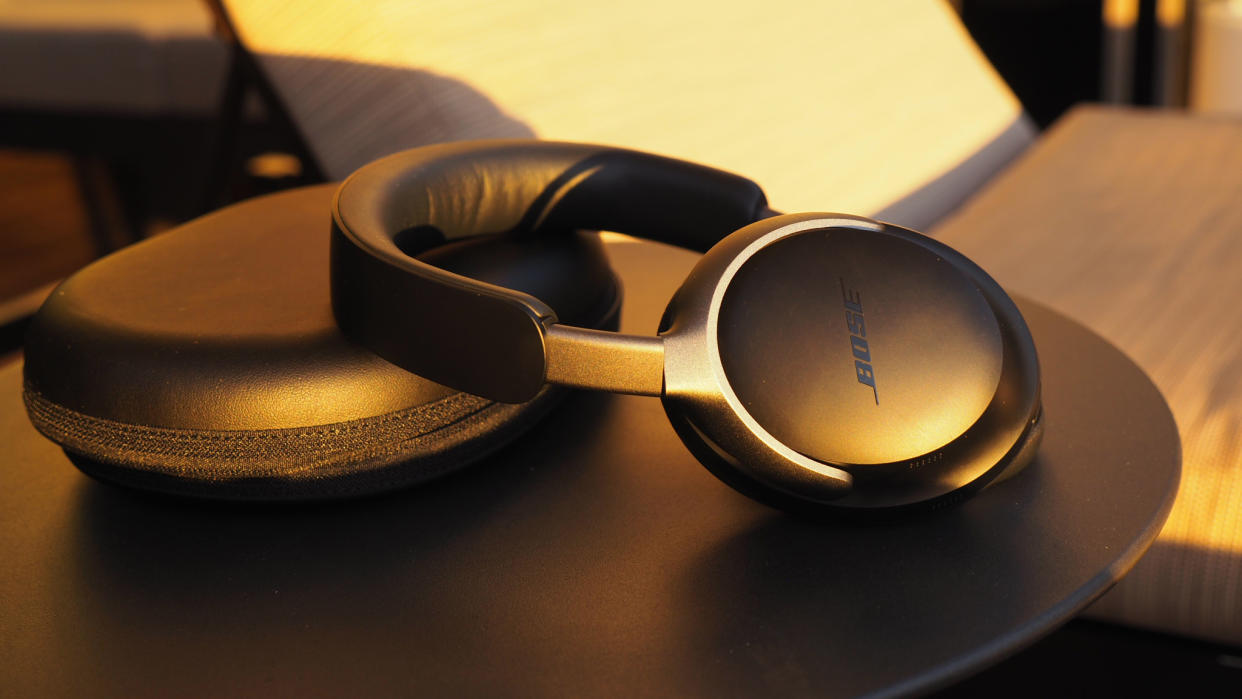
I've been an advocate of Bose's best noise-cancelling headphones for many years now, so when the QuietComfort Ultra Headphones landed in my lap – effectively replacing my six-year-long use of the Bose 700 Headphones – I was excited to see how much the brand had advanced its formula for producing the best travel headphones money can buy.
It didn't take long for me to get hooked either: having flown a seemingly never-ending 18-hours with the Bose QC Ultra Headphones on my head throughout, including during sleep, it was quickly apparent that these lightweight, comfortable and compact headphones deliver great sound and active noise-cancelling (ANC) that I think is unrivalled at present.
But here's the thing: the QC Ultra Headphones are pricey, even compared to their competition, and as someone whose job it is to test the best headphones I've already been through a bunch of astounding over-ear offerings this year. So it begs the question: is it worth spending so much of the Bose QuietComfort Ultra for pure travelling bliss?
Bose QC Ultra Headphones: Price & Availability
I say pricey to the point that it's italicised, so just what are we talking here? The Bose QC Ultra Headphones can be yours today for £449.95 / $429.95 / AU$659. They're available in Black, White Smoke (white), or Sandstone (brown with gold trim).
Now that's knocking on the door of (although a little less than) Apple's AirPods Max (£499 / $549 / AU$899). However, take the Bose's most obvious competitor, the Sony WH-1000XM5, which launched back in May 2022 with a list price of £379 / $399 / AU$649 (which has since dropped), and it's fairly close overall.
Bose QC Ultra Headphones review: What's new?
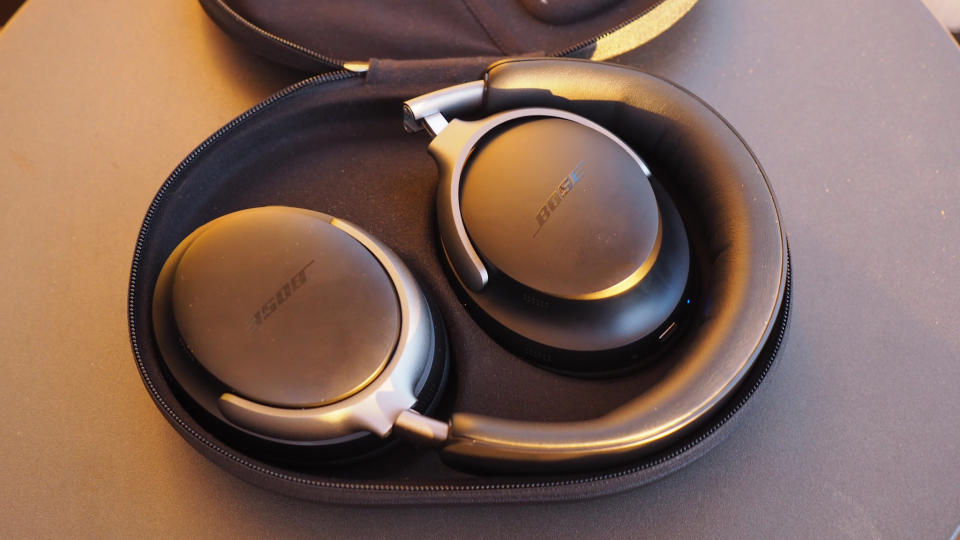
The Bose QuietComfort Ultra Headphones fit into the company's line-up as a sort-of replacement for the Bose Headphones 700. That might sound peculiar, as those in the know of Bose's range will be all too aware of the QuietComfort 45 model. To me the Ultra are akin to both the above models melded into an all-new product.
That's because the Bose QC Ultra Headphones, unlike the 700 model, do have a folding design, meaning they can be tucked away into a smaller footprint case (which is included) for transportation. But unlike the more plasticky and exposed-screw design of the QC 45 model, the Ultra Headphones appear seamless and are just visually more appealing.
There is a key additional new feature: Immersive Audio, which delivers a spatial audio effect so you can 'move through' the soundstage as if it's in front of and around you (this can be set to Static or Motion for various use-cases). Active noise-cancelling (ANC) makes a return, too, albeit in its most advanced and strongest form to date.
Bose QC Ultra Headphones review: Design & Usability
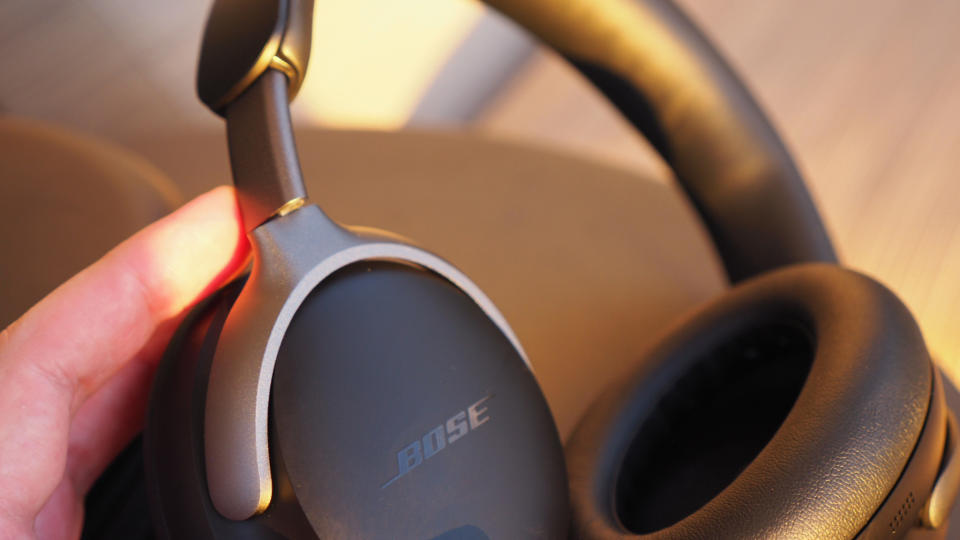
While the Bose 700 Headphones were an all-black finish (well, assuming you didn't get the silver, blue or that other rose-gold accented version), my review pair of QC Ultra Headphones are black with a gunmetal silver section for the length-adjustable arms and earcup-holding sections (this is the same in White Smoke, but an I-really-don't-like-it gold finish for the Sandstone). It's a neat and tidy look here, as you can see from my photographs in this review.
As a long-time user of the Bose 700 Headphones I was immediately convinced that the Bose QC Ultra Headphones felt lighter. They do... but only by two grammes (at 252g versus 254g). My shaky old hands wouldn't be able to identify that by touch, as its not discernible, so I put it down to perception. Having laid the two headphones one atop the other, they're a very similar size and the QuietComfort Ultra actually has a thicker, wider headband – which is great for comfort.
Being able to fold the QC Ultra Headphones down is great. And the included carry case is nice and small: my tape-measure tells me 21.5 x 15.5 x 5.2cm overall, which will easily slot into all sorts of bags with ease. Included within is a 2.5mm-to-3.5mm cable if you need to use the headphones wired, which nestles within a little elasticated pocket within the case.
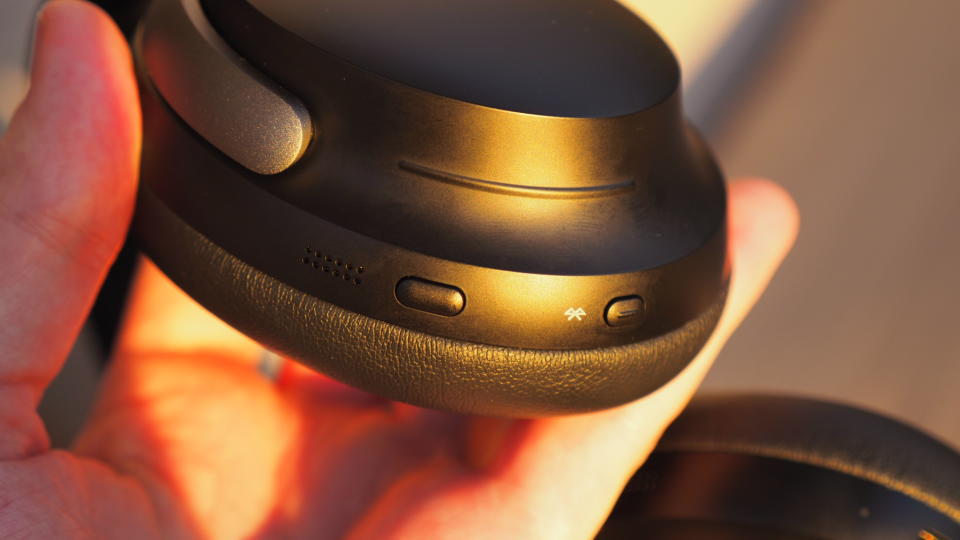
In terms of control the QC Ultra Headphones feature fairly minimal controls: there's an on/off/Bluetooth connect button and cycle-through-ANC button on the right earcup, plus small touch-control strip for controlling one function (as set within the app); the left earcup, meanwhile, houses no physical buttons but is where you'll find the USB-C port for charging and the 2.5mm cable connector. You can also use voice assistants should you choose.
Personally I really miss the touch controls of the 700 Headphones, which enabled tap, double-tap, swipe up/down and swipe forward/back to control the basics of play/pause, volume up/down and track skip/rewind. I used that all the time and the QC Ultra Headphones don't offer anything so rich from that touch-control strip – indeed it can only tell you the battery level, change Immersive Audio, activate voice assistant, or resume Spotify playback. I was hoping for more, but maybe a future software update can fix that so volume control is made available.
The associated Bose Music app is a nifty addition overall though. It can help explain through some of the specifics – like, what is the difference between Immersive Audio in Off/Still/Motion? – and permit you to customise, from graphic equalisation to which settings are or aren't available from the headphones' physical controls. It's robust and I also find it an easy way to check on the battery life, which is shown as a percentage and is accurate (although a voice warning tells you when it's low and needs charging).
Bose QC Ultra Headphones review: Features & Performance
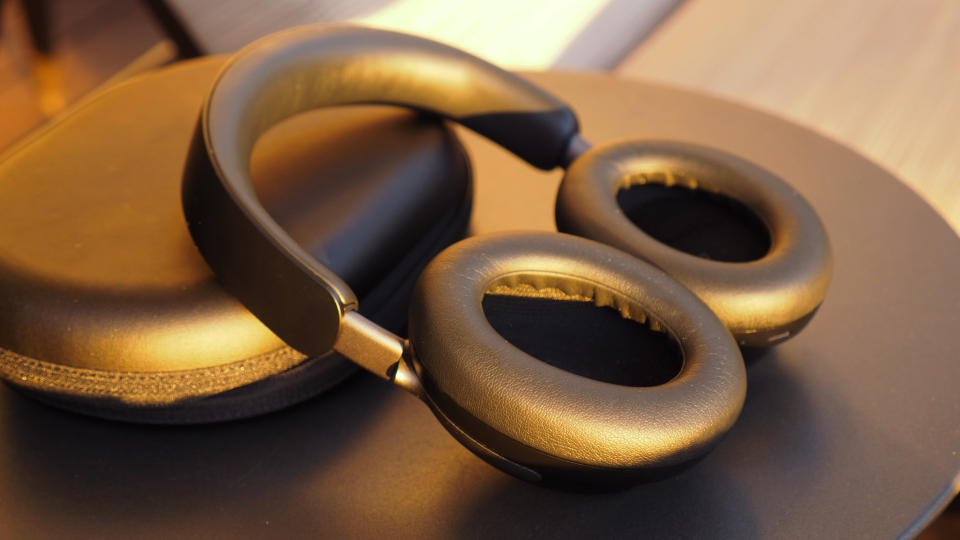
From the moment I put the Bose QuietComfort Ultra Headphones on my head I was taken aback by just how connective the sound profile is – with the significant active noise-cancellation (ANC) a major part in enabling the headphones to drive sound to my ears without external distractions. If you're after top-class ANC then, well, look no further – for me these are the best of the best in that regard and ideal for travelling.
But it's a bit more complex than that, too, as there are a variety of options at play. The ANC can be adjusted, for example, but only if add a new 'Mode' within the app (such as Commute, Focus, Music, etcetera) and dial in from zero to 10 just how strong you want that ANC to be. For me it's at maximum at all times, as the Aware mode – which many brands call passthrough, for hearing some sound around you – I find overly magnifies external sound and isn't the option for me.
Beyond the ANC settings, however, it's this new Immersive Audio feature that's actually a far bigger deal than I first realised. That's because it's on by default, not that you'd necessarily know if just looking straight ahead. It's only when then moving your head – which gives you spatial depth, as if turning your head in a three-dimensional arena of sound – that you can feel what this does for the experience. I find it pretty astonishing, and it's great that there's Still and Motion to avoid feeling too weird when you're seated and moving, such as when on a train or plane.
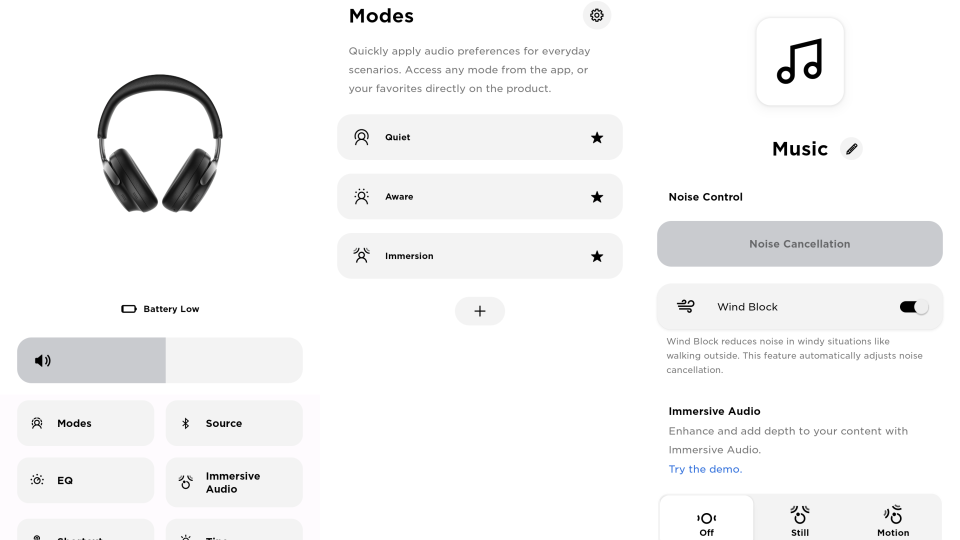
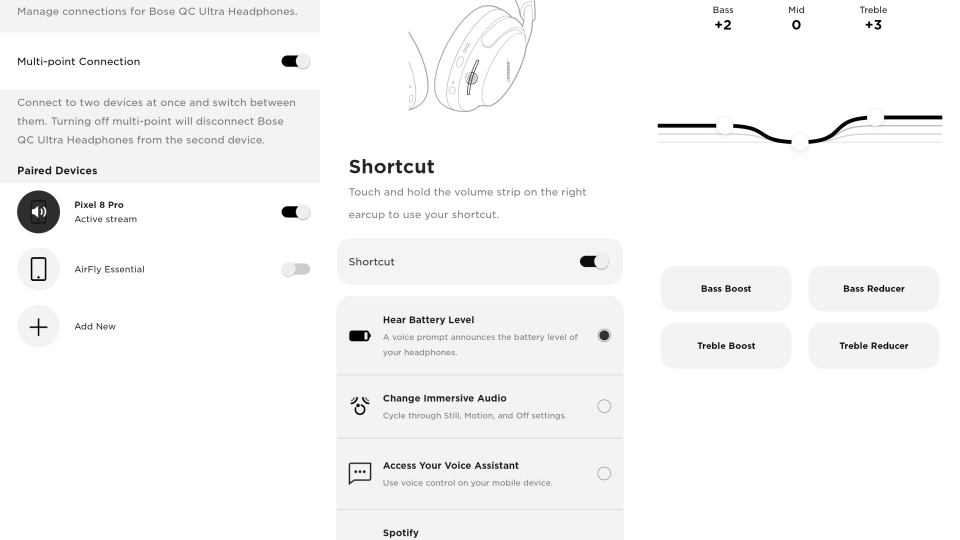
But I do think that Immersive Audio needs to be taken with some consideration too. Yes, it sounds great for many sources, and I've really enjoyed that bolstered, more surrounding soundscape that it's introduced to much of my favourite music. That said, however, the processing does cause the sound to be different. For some people I suspect this will be a sometimes bad thing; that oddly 'fizzier' top-end as a result of its activation, for example, or feeling the sensation of the forward point swooping to reposition if you hold your head in a new forward position. It's great, but it's not great for all things. Sometimes stereo cuts it perfectly fine.
Fortunately, whether in Stereo or Immersive Audio, the Bose QC Ultra Headphones are masters at audio. Yes, it's a very 'Bose' sound, which some purists may not love, but now I'm so many years deep into Bose ownership I really relish the bass delivery – and the QC Ultra do not disappoint when it comes to laying on the low-end delivery. They're suitably loud without being 'crunchy', too, so whether you want delicate or to try and make your ears bleed, the option is there.
But it's really the sound as a whole, in conjunction with the customisation from the app, that means the Bose QuietComfort Ultra Headphones will deliver superb sound across the board whatever your tastes. All while wrapped in sumptuous active noise-cancelling bliss. That may mean a slightly more 'artificial' sound than some more open headphones, but for me – and in the vested interests of travel in particular – this combination of sound quality and customisable features is sheer perfection for what it's intended.
Bose QC Ultra Headphones review: Verdict
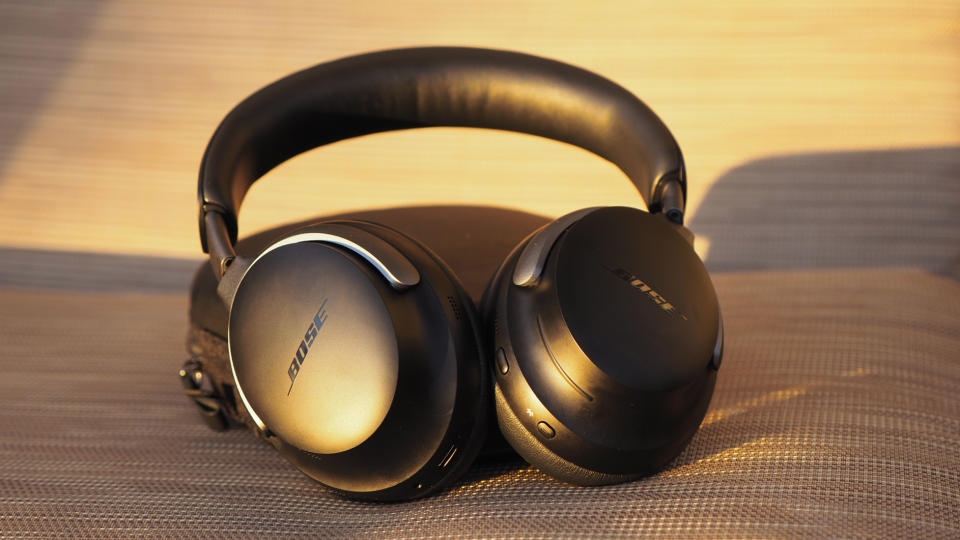
I suspect you could probably tell from the intro, but I'm fully smitten by the Bose QuietComfort Ultra Headphones thanks to their superb active noise-cancelling and stellar sound quality. If you're looking for incredible travel headphones then you can do no better.
However, the biggest hurdle is going to be that asking price. It's certainly high, but I do think it'll pay for itself over time – my Bose 700 Headphones are still going six years later (after an earcup covering replacement from sheer volume of use), and if that's testament to what the brand offers then it'd be like paying £6.25/$6/AU$9 a month (which is less than the best streaming services) over that same period.
Sure, the best headphones of today offer stiff competition, and many of Bose's arch rivals deliver also exceptional results, but in the world of ANC and travel I think the QuietComfort Ultra Headphones are the ultimate experience.
Also consider
If the QuietComfort Ultra Headphones' asking price is a bit too rich and you can cope without a folding design or the spatial audio features then the much older Bose 700 Headphones are available at a bargain price right now – for however much longer they're available!
In terms of direct and more current competition, however, it's the Sony WH-1000XM5 that will certainly give Bose a run for its money. These will cost a little less, and also offer superb ANC and sound, which could tip the balance in their favour – though I suspect it's about personal preference and, for me, I prefer the Bose design.
